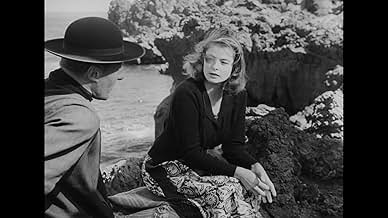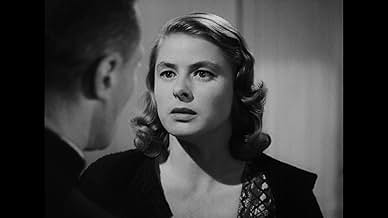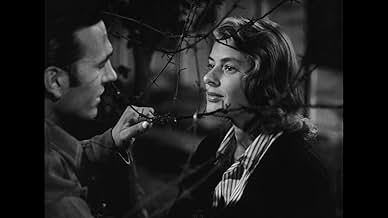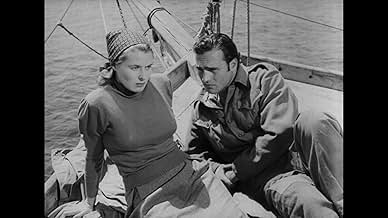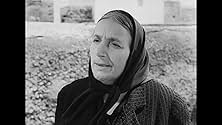IMDb-BEWERTUNG
7,2/10
8293
IHRE BEWERTUNG
Karin, eine junge Frau aus den baltischen Ländern, heiratet den Fischer Antonio, um einem Gefangenenlager zu entkommen. Doch sie kann sich nicht an das harte Leben in Antonios vulkanbedrohte... Alles lesenKarin, eine junge Frau aus den baltischen Ländern, heiratet den Fischer Antonio, um einem Gefangenenlager zu entkommen. Doch sie kann sich nicht an das harte Leben in Antonios vulkanbedrohtem Dorf Stromboli gewöhnen.Karin, eine junge Frau aus den baltischen Ländern, heiratet den Fischer Antonio, um einem Gefangenenlager zu entkommen. Doch sie kann sich nicht an das harte Leben in Antonios vulkanbedrohtem Dorf Stromboli gewöhnen.
- Auszeichnungen
- 2 Gewinne & 1 Nominierung insgesamt
Gaetano Famularo
- Man with Guitar
- (Nicht genannt)
Angelo Molino
- Child
- (Nicht genannt)
Roberto Onorati
- Man
- (Nicht genannt)
Handlung
WUSSTEST DU SCHON:
- WissenswertesDuring production of this film, Ingrid Bergman entered into an extra-marital affair with Roberto Rossellini and became pregnant, the two eventually getting married and having three children. The resulting scandal in America effectively blacklisted her from the North American movie market and she was even condemned by politicians and religious figures. She was finally forgiven and welcomed back to America upon the success of Anastasia (1956), but her Hollywood career was temporarily ended by this movie.
- PatzerWhen the police officer is typing the report, he does not strike nearly enough keys to produce the amount of information shown on the paper.
- Crazy CreditsOpening credits: "I was found of them that sought me not; I was made manifest unto them that asked not after me." (New Testament, St. Paul's letter to the Romans, Chapter 10, Verse 20)
- Alternative VersionenSeveral running times exist. The main difference between the 81 min. US version and the 105 min. Italian version was in the ending, with religious themes cut out.
- VerbindungenEdited into Geschichte(n) des Kinos: Une histoire seule (1989)
Ausgewählte Rezension
Stromboli is a film with the look of Flaherty's `Man of Aran' and the dramatics of von Trier's `Breaking the Waves'. The story is the tragedy of a woman named Karin, a Lithuanian refugee after WWII and her pursuit of a better life marrying an Italian peasant and moving down with him to his birthplace, a volcanic island off the coast of southern Italy.
Rossellini portraits her heroin without sentimentalism or affection of any kind. He seems to be more interested in revealing her dark sides and miseries, but as Bergman's performance is so emotionally raw, we cannot but stick with her to the end of her journey. We do not pity her, but take pity with her. Rossellini's strong Catholicism usually forces us to live through his films as Catholics, regardless of which belief one may have.
If war was hell then the post war can be redemption time. Karin has nostalgia of her past, a lost-paradise, and all her efforts are put to restore that primal state. She's an Eva cast away from Eden, with somehow Bovarian ambitions, trying to reach prosperity at any cost. Her chances are scarce, so she takes the only opportunity she gets to leave the camp, marrying Antonio, a peasant whom she first kisses through barbed wire. She will soon realize that Antonio's island is miles away of the paradise of her dreams. The place is barren and the locals are hostile. She's trapped in a labyrinth surrounded by sea and menaced by an active volcano. Any form of relationship, even with her husband, is impeded because of a communication problem. Technically she cannot speak the language. But she cannot either penetrate a hermetic, oppressive world ruled by rites and tradition. If paradise was a state where men could speak the language of the gods in harmony with nature, Karin's pilgrimage will ultimately have to restore that dialogue, rebuild that bridge with origin.
In her symbolic descent to primitivism she learns the meaning of life in the hard way, and at the same time she follows all the phases of mankind from the first cry of the new born, to subsequent life in a cavern, cave-painting, elemental worshipping, fishing for subsistence and conversion. Karin's fault is her self-sufficiency, denying the existence of a superior order and her mundane ambition of a destiny ruled by luxury and comfort. She thinks the place is filthy and defines her belonging to `a different class'. When she realizes that there's no place for glamour in Stromboli she turns into an Eve and tempts the local priest. This behaving sooner or later will provoke the wrath of the gods, portrayed in the everlasting volcano to which the fate of the islanders is attached from immemorial days. To outcome her tragic fall, Karin should ascend the top of the mountain while getting rid of her material belongings (the money, the suitcase), rise up her head to the sky and address God. Rossellini doesn't show us if she saves her life or not because the thing is that she assumed her role of creature and thus her subordination to a supreme kind. Same as the villagers, who stoically accept the infuriated eruptions, or the fishermen that depend on the fruitful sea.
The most unforgettable sequence of the film is the one of the tuna fishing. Rossellini is so precise in the choosing of the images and the rhythm of the editing that the one feels that is seated in one of the boats bringing the prays. But the scene has much more than an aesthetic value. It works not only because it's beautiful; it is also informative for the story, dramatic in itself and in the events of the film, and symbolic both for the story and for Bergman's character, who watches the action from a neighboring boat. Such an adjustment distinguishes art from a good movie.
Rossellini portraits her heroin without sentimentalism or affection of any kind. He seems to be more interested in revealing her dark sides and miseries, but as Bergman's performance is so emotionally raw, we cannot but stick with her to the end of her journey. We do not pity her, but take pity with her. Rossellini's strong Catholicism usually forces us to live through his films as Catholics, regardless of which belief one may have.
If war was hell then the post war can be redemption time. Karin has nostalgia of her past, a lost-paradise, and all her efforts are put to restore that primal state. She's an Eva cast away from Eden, with somehow Bovarian ambitions, trying to reach prosperity at any cost. Her chances are scarce, so she takes the only opportunity she gets to leave the camp, marrying Antonio, a peasant whom she first kisses through barbed wire. She will soon realize that Antonio's island is miles away of the paradise of her dreams. The place is barren and the locals are hostile. She's trapped in a labyrinth surrounded by sea and menaced by an active volcano. Any form of relationship, even with her husband, is impeded because of a communication problem. Technically she cannot speak the language. But she cannot either penetrate a hermetic, oppressive world ruled by rites and tradition. If paradise was a state where men could speak the language of the gods in harmony with nature, Karin's pilgrimage will ultimately have to restore that dialogue, rebuild that bridge with origin.
In her symbolic descent to primitivism she learns the meaning of life in the hard way, and at the same time she follows all the phases of mankind from the first cry of the new born, to subsequent life in a cavern, cave-painting, elemental worshipping, fishing for subsistence and conversion. Karin's fault is her self-sufficiency, denying the existence of a superior order and her mundane ambition of a destiny ruled by luxury and comfort. She thinks the place is filthy and defines her belonging to `a different class'. When she realizes that there's no place for glamour in Stromboli she turns into an Eve and tempts the local priest. This behaving sooner or later will provoke the wrath of the gods, portrayed in the everlasting volcano to which the fate of the islanders is attached from immemorial days. To outcome her tragic fall, Karin should ascend the top of the mountain while getting rid of her material belongings (the money, the suitcase), rise up her head to the sky and address God. Rossellini doesn't show us if she saves her life or not because the thing is that she assumed her role of creature and thus her subordination to a supreme kind. Same as the villagers, who stoically accept the infuriated eruptions, or the fishermen that depend on the fruitful sea.
The most unforgettable sequence of the film is the one of the tuna fishing. Rossellini is so precise in the choosing of the images and the rhythm of the editing that the one feels that is seated in one of the boats bringing the prays. But the scene has much more than an aesthetic value. It works not only because it's beautiful; it is also informative for the story, dramatic in itself and in the events of the film, and symbolic both for the story and for Bergman's character, who watches the action from a neighboring boat. Such an adjustment distinguishes art from a good movie.
- TheFerryman
- 1. Feb. 2004
- Permalink
Top-Auswahl
Melde dich zum Bewerten an und greife auf die Watchlist für personalisierte Empfehlungen zu.
- How long is Stromboli?Powered by Alexa
Details
- Erscheinungsdatum
- Herkunftsländer
- Sprachen
- Auch bekannt als
- Of God's Earth
- Drehorte
- Produktionsfirmen
- Weitere beteiligte Unternehmen bei IMDbPro anzeigen
Box Office
- Budget
- 1.000.000 $ (geschätzt)
- Weltweiter Bruttoertrag
- 17.532 $
- Laufzeit1 Stunde 47 Minuten
- Farbe
- Seitenverhältnis
- 1.37 : 1
Zu dieser Seite beitragen
Bearbeitung vorschlagen oder fehlenden Inhalt hinzufügen



